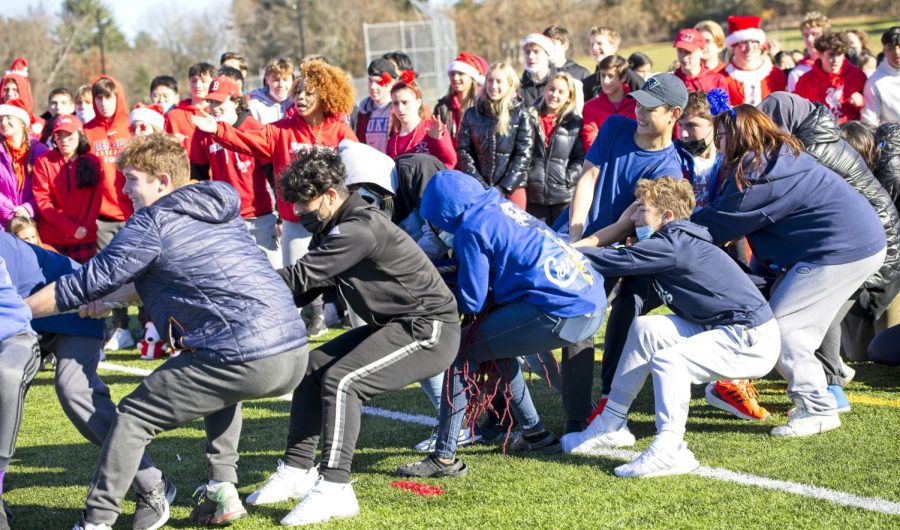MOTS: WHS teachers reflect on Spirit Week
Credit: Courtesy of Courtland Ferreria-Douglas
The Class of 2024 competes against the Class of 2022 in tug-of-war on Spirit Day 2021. Spirit Day 2022 will be held on Wednesday, Nov. 23.
November 28, 2022
Although Spirit Week is now an annual tradition at Wayland High School, it did not always take place. Before Spirit Week, teachers utilized the Wednesday before Thanksgiving break to bond with their students, conduct normal class activities or give out tests. Now, some teachers have a complicated relationship with Spirit Day. Join WSPN’s Katya Luzarraga as she asks different teachers about their opinions on Spirit Week.
What is the history of Spirit Week?
History teacher Sean Chase:
There’s a sense of history in what [Spirit Week] used to be and what it is now. I’ve been teaching at WHS for almost 22 years, and Spirit Week has changed. I’ve noticed that teachers are more frustrated with classroom management issues that occur throughout the day [during Spirit Week]. When Spirit Day was initially created, the individual events were run by student council members. Over the years, students have, in a sense, assumed that the day would be run by teachers, which was never the original plan. The burden of Spirit Day has shifted to teachers to run the activities, with rules that, in some cases, we are unfamiliar with or aren’t comfortable carrying out.
Spanish teacher Jessica Skehan:
I’ve been here long enough to have had the regular school day on the Wednesday before Thanksgiving, which was just very short 25-minute [class] blocks. Sometimes, I gave quizzes or tests, because it was still a school day. When Spirit Day first started, we did a service day one year where the kids really buckled down and each did service activities. For example, they wrote letters to the troops and made food for people in homeless shelters. Now, Spirit Day has been the thing that we’ve had for probably 14 years. I think Spirit Day is just what the school has gotten into the rhythm of holding each year.
Math teacher Hannah Marton:
There wasn’t always a Spirit Week. I’ve been [teaching at WHS] for 20 years, and there didn’t used to be a Spirit Day on the Wednesday before break. It used to be that we had 20-minute-long classes. Before this whole Spirit Day started, for the first three or four years after I came to WHS, we had classes. Then, came along the classroom games, and eventually it evolved into this set-up of advisories traveling and grades competing against each other. Since then, Spirit Day hasn’t changed a whole lot, except that now we hold an entire Spirit Week.
English teacher Peter Galalis:
The first Spirit Day happened in the old high school building. It was just a traditional pep rally, with cheerleaders and the football team, held in the field house. [Spirit Week] has shifted to include a dodgeball tournament and stuff like that in some years. Somewhere along the way, the student council came up with the idea to not have classes and organize different games and activities. Initially, Spirit Week had its ups and downs for those first few years. It wasn’t instituted with the idea that this is what we’re going to do every year, it was just something fun to try.
What are your opinions on Spirit Week?
Chase:
I have the opinion that we should get rid of Spirit Day entirely. What I’ve noticed over the years is that Spirit Week is more disorganized every year, in terms of who’s running what and what the rules of the games are. [Spirit Day has] lost a lot of its initial momentum from back in the day. What Spirit Day basically turns into, for teachers, is a series of unruly classes throughout the day, with students that we don’t necessarily know. I think that’s what the big issue of Spirit Day is. I’d rather be in class for 25 minutes, doing class team-building activities with my own students, as opposed to a music trivia game.
History teacher Patricia Halpin:
I think that Spirit Day is very chaotic, and not a very useful or productive way to use time. There are students who are introverts and really dread some of the activities during Spirit Day. For example, during Pictionary in previous years, I’ve seen students who truly do not want to come up and participate. So, there’s this sort of pressure about Spirit Day that presents administration with a perfect opportunity to create something different in years to come.
Skehan:
I’ve always enjoyed the day. When I think about the day unfolding, I get a little worried. I worry that kids aren’t going to come to school, or they’re not going to like it. However, I’ve always felt like every Spirit Day, the people that are there get really into it.
Physics teacher Paul Shiffler:
Spirit Week has been going on for a long time. I’m not really committed to Spirit Week either way. It’s like another day where you come into school and do what you’re asked to do. I get that some students don’t come into school on Spirit Day, but it’s better than the alternative of giving out 20-minute quizzes. You kind of get the day for free, because if you’re not traveling, what else are you going to do [on that Wednesday]?
Marton:
I’m okay with Spirit Day, at best. I prefer it over a 20-minute long class where I cannot do anything. However, I could also do something fun with my class during that time, or spend time at home. Doing something with my class wouldn’t be in the spirit of the school, it would be me having fun with my students.
History Department Head David Schmirer:
Regarding Spirit Day, there’s just a lethargy within the staff, given the matter of class time being wasted on Spirit Day. It’s still a day of school, so it would be more meaningful to be doing activities, even light-hearted activities, with your own students, as opposed to having to wrangle students that you don’t know, and dealing with kids misbehaving. So, it becomes a major disciplinary nightmare for the day. There are so many ways to make Spirit Day a lot more meaningful, opposed to what it’s devolved into now. For me, Spirit Day feels like the longest day of the year, even though we’re only here for four hours.
Galalis:
My opinions on Spirit Day have varied from year to year based on how organized it seems, and how the student council executes it. It’s always been slightly different in format and structure, so some years Spirit Day runs really smooth, and others it’s bumpier. When it’s well-run, it’s a fun day. When it’s a little disorganized, it can seem chaotic. Activities set up for teachers to run [can be] a little stressful, because we need to read the directions and control the students, all at the same time.
English teacher and student council advisor John Keene:
I think that Spirit Week is something that is designed to give students a little bit of a break, but also some time to have activities together. I think that a little friendly competition makes a lot of things fun. I think it’s really good that the school is committed to having Spirit Week events that can contribute really positively to the school culture for the students especially. We recognize that these are events that the students really like, but for the teachers it can be stressful, so we put a lot of thought and effort into how we can make it easiest for teachers while still being a lot of fun for the kids.
Do you think that Spirit Day is an accurate reflection of WHS spirit?
Schmirer:
In terms of organizing, I don’t see much spirit coming out of it. Historically, no matter how the underclassmen perform, the seniors will just win. In the end, it’s just a day for the seniors to have the spotlight.
Skehan:
I don’t know, it’s sort of like Halloween. You know that the seniors are going to be the group with the most people participating. Obviously, during tug-of-war the students who are strong physically are going to win. These are 18-year-old kids, so they’re going to be the ones who are stronger in the end, although the juniors put up a good fight as well. It does sort of feel like no matter what students do, the seniors will win. But, some kids know that in a couple of years, that’ll be them and they’ll be able to win.
Chase:
What I think about it is, [what’s the point] of Spirit Day? What’s the spirit for, because no one’s going to the Thanksgiving Day football game the next day. I’m there every year, it’s just parents and a handful of alumni. [Every year], there’s a high absentee rate for students and teachers on [Spirit Day] and those numbers alone speak volumes regarding what people think about the day.
Shiffler:
The fact that seniors win every year is the nature of Spirit Day. I thought that one year the juniors won Spirit Week. I mean, it’s one of those things that is really just perspective. Think about it this way, everyone’s going to become a senior eventually. So, everyone will get a chance to win at least once. How wonderful is that? It’s a feel-good experience that you need to wait four years to experience.
Marton:
I think there is definitely a rivalry between Color Blast. When the Class of 2019 seniors didn’t win Color Blast, it was a giant upset, because it was always expected that the seniors would win Color Blast every year. Spirit Week represents school spirit, and that year, the sophomores won because they were the best. On Spirit Day, the kids who are more introverted are overshadowed by the louder, more outgoing kids. Really loud, overbearing senior boys can make it a bad experience for other students, and I have seen that in the past. This is coming from an enthusiasm to show spirit, but teachers need to make sure that Spirit Day is an inclusive environment.
Galalis:
I think Spirit Week is a good representation of WHS spirit. There’s usually a good amount of students who get into Spirit Day and enjoy it. For the most part, students come to school with spirit and the mindset of enjoying the day. Wayland has pretty good school spirit that’s balanced throughout the grades.
Are there any negative aspects of Spirit Week?
Halpin:
Yes. Regarding decorating the hallways for Color Blast, I find that as such a waste of material, and then it just gets messy. Often, it’s the teachers who are cleaning it up, so I don’t see a point for it.
Chase:
There’s a mixed message about Spirit Day. It’s promoting class rivalries, which is something that the school has been trying to deconstruct and eliminate that component of high school where, ‘seniors do this’ and ‘sophomores do this’ and other rules set by grade. It seems to send messages antithetical to the goals of WHS.
Marton:
The mess of Color Blast is annoying. [Teachers] can make sure that kids clean up, or somebody cleans up the mess, because it’s not nice to leave it for the custodians to clean up. Pre-pandemic, we also used to have food in advisory. Spirit Day would start with advisory, and for that 25-minute advisory, it was like a community breakfast, and it would leave such a mess. That and Color Blast definitely left lots of mess for custodians to clean up.
Do you think that Spirit Week is a tradition that should carry on?
Skehan:
I do. I think if you had me compare Winter Week to Spirit Week, the latter would win. Spirit Week is obviously shorter, and I do like Spirit Day itself, where you take a day and do activities that aren’t school related. I also really enjoy bonding with my advisory.
Schmirer:
Spirit Day has completely devolved in previous years. There are different things to do on Spirit Day to make it better for everybody. An idea that I heard within the history department is to have the theater crew carry out the whole production, or show a movie in class that has some educational impact where you can go back to your advisory and discuss. [WHS could] highlight student accomplishments in sports, as well.
Marton:
Yes, I do. The student council works really hard each year to create a fun Spirit Week. Often, it’s run really well, and there’s a lot of work put into making sure that students have a good time. Spirit Day is worth it on that short Wednesday because, otherwise, these 20-minute long classes would be terrible. It’s very hard to get anything done. Teachers cannot do anything meaningful because a lot of kids are already gone for the Thanksgiving break.
Chase:
[Spirit Day] is more of just a checklist item that the student council has to do, but that’s the problem, because then there’s not a lot of thought put into Spirit Day I wouldn’t even describe it as a tradition, because I’ve been here for 21 years, and we didn’t always hold Spirit Day. Some of the faculty advisors that have been in the student council don’t really have the same sense of what Spirit Day used to be, opposed to what Spirit Day is now.
Halpin:
I, personally, don’t think that the student council knows how to approach alternatives to Spirit Day, but I don’t think they want to be the ones to end it. Without having something set-in-stone that’s equally as interesting as Spirit Day, that decision to get rid of the event would make the student council very unpopular.
Galalis:
Within three years of the student council creating Spirit Day, it became all that anybody remembered, in terms of the student body. Students now come in with the expectation that Spirit Day is what WHS does on the Wednesday before Thanksgiving break. If students enjoy Spirit Day and it’s well-run, I’m fine with it.


























